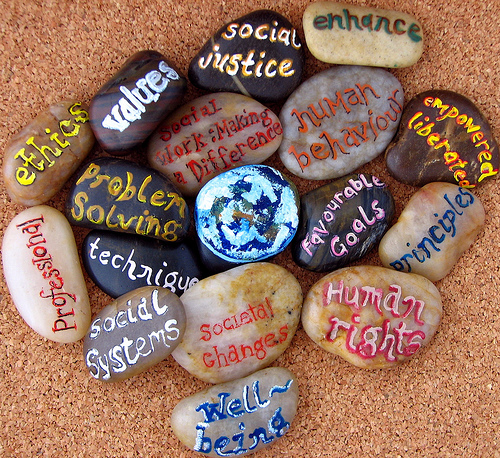
I think most people who choose social work as a career are pretty caring and compassionate to begin with, but their training makes them a very special group of professionals. One of the things SW are taught is that providing services, be it mental health counseling or community involvement, can never be about them and their needs and beliefs. They must always examine what they are doing and how they are guiding others, a process called 'critical self examination', to understand their motives for acting in a certain way or moving in a certain direction. SW are guided by a code of ethics, and all of their actions must never violate this code.
From the preamble to this code:
"The primary mission of the social work profession is to enhance human wellÂbeing and help meet the basic human needs of all people, with particular attention to the needs and empowerment of people who are vulnerable, oppressed, and living in poverty. A historic and defining feature of social work is the profession’s focus on individual wellÂbeing in a social context and the wellÂbeing of society. Fundamental to social work is attention to the environmental forces that create, contribute to, and address problems in living."
As a social worker, I had to discover how religious a person was and what their specific beliefs were because often, it was their interpretation of these beliefs that interefered in their lives. Sometimes, providing effective services meant getting their ministers involved, or encouraging them to use 'tools' that were effective for them in the past- like prayer and meditation, to cope with stress and losses. It mattered not what I believed. What mattered was what the client believed.
Being a SW meant suspending my own beliefs and approaching every client with an open mind. My clients were of every race and religion, which is likely why I know a bit about various religions. I never deliberately delved into their beliefs, but these beliefs were frequently at the core of their distress, and I had to figure out how to find the strengths, the 'tools' within their own belief systems to help get past the problem- or cope with it better.
I think social work practice taught me a few things about religion and religious tolerance. First of all, I was surprised by how often religious beliefs (or distortions thereof) created sometimes serious conflicts for my clients. It also taught me to accept every person's beliefs and values without judgement or criticism. We all have just one go-around in this world and we are all just trying to make it the best we know how.


